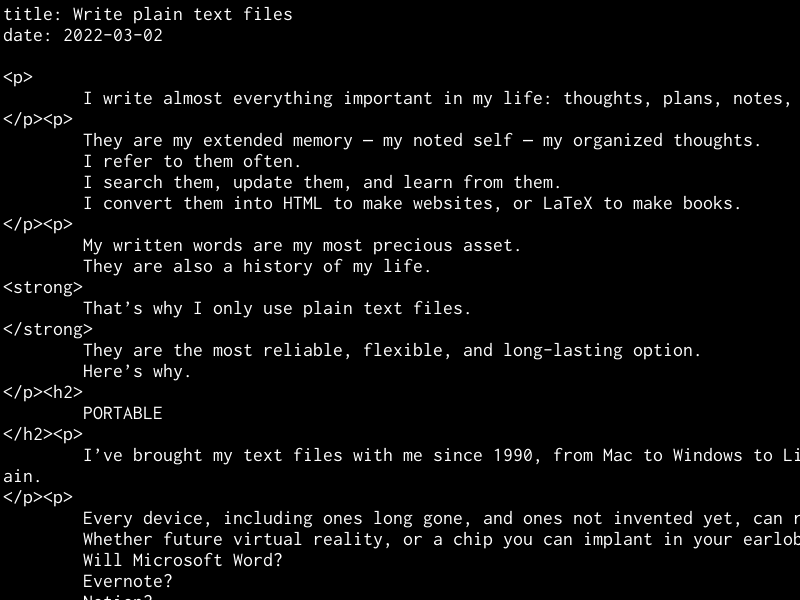Você não pode selecionar mais de 25 tópicos
Os tópicos devem começar com uma letra ou um número, podem incluir traços ('-') e podem ter até 35 caracteres.
index.md 5.8KB
index.md 5.8KB
title: Write plain text files
url: https://sive.rs/plaintext
hash_url: 1dd0383e3a
I write almost everything important in my life: thoughts, plans, notes, diaries, correspondence, code, articles, and entire books.
They are my extended memory — my noted self — my organized thoughts.
I refer to them often.
I search them, update them, and learn from them.
I convert them into HTML to make websites, or LaTeX to make books.
My written words are my most precious asset.
They are also a history of my life.
That’s why I only use plain text files.
They are the most reliable, flexible, and long-lasting option.
Here’s why.
PORTABLE
I’ve brought my text files with me since 1990, from Mac to Windows to Linux to BSD, from PCs to laptops to tablets to Android to iOS to a tiny device the size of my thumb, and back again.
Every device, including ones long gone, and ones not invented yet, can read and edit plain text.
Whether future virtual reality, or a chip you can implant in your earlobe, plain text will be there.
Will Microsoft Word?
Evernote?
Notion?
Maybe.
Maybe not.
But plain text?
Always.
Everywhere.
UN-COMMERCIAL
Every few years a new company says you should use their special format.
You have to pay them a monthly fee to use it — or keep all of your documents in their care.
They offer some convenience or features, but at the cost of flexibility, portability, and independence.
When you store your writing in one company’s unique format, then you need that program to access it.
Then the economy takes a turn, they go out of business, and your work is trapped in an unusable format.
You will outlive these companies.
Your writing should outlive you.
Depending on companies is not an option.
Plain text is un-commercial.
It removes you from the world of subscriptions and hype.
There will always be plenty of free, non-commercial software in the public domain for reading and editing text files.
OFFLINE
There are places and times when you can’t get online.
Don’t depend on any tool that needs an internet connection.
There are great benefits to being intentionally offline and unreachable, to focus.
It’s a super productivity boost.
You need to be able to write, and have access to all your writing, during these times.
NO DEPENDENCIES
If you rely on Word, Evernote or Notion, for example, then you can’t work unless you have Word, Evernote, or Notion.
You are helpless without them.
You are dependent.
People tell me about more tools I could use in addition to my text files.
But I don’t need or want anything else.
Plain text files and a basic text editor are enough.
This is everything you need for great thinking and writing.
(A paper notebook and pencil are enough, too.)
If you only use plain text, you can work on any device, forever.
The less you depend on, the better.
Peace and focus come when you stop looking for more.
EASIEST TO CONVERT
Plain text can be converted into anything else.
HTML, Markdown, JSON, LaTeX, and many other standard formats, are just plain text.
I’ve written four books and four hundred blog posts in plain text.
You can make your own personal formats in your plain text files.
Maybe in each diary entry, the first two lines are like:
date: 2022-02-28 tags: where-to-live, kids, dog, anxious
Then it’s easy to use any little scripting language like Ruby, Python, or JavaScript to grab the date and tags, and use them for categorizing, sorting, renaming, archiving, or exporting.
Or if you don’t want to do it yourself, then it’s easy to find someone who can.
Anyone who’s been programming for more than a week should be able to do it easily.
NEED HIERARCHY?
Use directories — also known as folders.
These are also good for keeping your text together with other files like images and audio.
Documents/ Documents/Diary/ Documents/Diary/2022/ Documents/Diary/2022/2022-02-28.txt Documents/Thoughts/ Documents/Thoughts/WhereToLive/ Documents/Thoughts/WhereToLive/2019-06-30.txt Documents/Thoughts/WhereToLive/2020-01-18.txt Documents/Ideas/ Documents/Ideas/MusicalChairs.txt Documents/Ideas/NewHouse/ Documents/Ideas/NewHouse/Design/ Documents/Ideas/NewHouse/Design/entryway.jpg Documents/Ideas/NewHouse/Design/roof.jpg Documents/Ideas/NewHouse/Architect/ Documents/Ideas/NewHouse/Architect/JM_Lim.txt Documents/Ideas/NewHouse/Architect/TPS_Inc.txt
NEED VISUALS OR GRAPHICS?
Need visual mind-mapping with circles and lines?
Maybe you do.
But maybe you don’t.
Maybe it’s just another distraction, focusing on the tools instead of your thinking.
I love that plain text files have no formatting to tinker with.
A tab key, SHIFT KEY, and vertical line breaks can go a long way, keeping you writing instead of formatting.
If you really need graphics, do your drawing using something else.
Digital drawing into SVG files.
Paper drawing, scanned into JPGs.
Formats that aren’t owned by any company.
Formats that will outlast you.
Keep your graphics files alongside your text files.
But keep your text as plain text.
CONCLUSION
Reliable, flexible, portable, independent, and long-lasting.
Plain text files will be readable by future generations, hundreds of years from now.
I especially enjoy the tranquility of their offline, non-commercial nature.
They’re quiet.
They’re focused.
(As I aim to be.)

